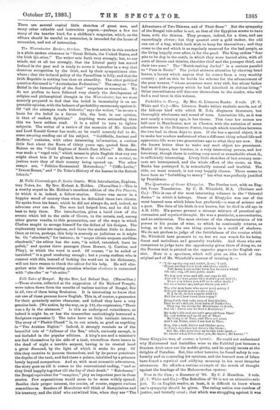Folk Tales of Bengal. By the Rev. Lal Behari Day.
(Macmillan.) —These stories, collected at the suggestion of Sir Richard Temple, were taken down from the mouths of various natives of Bengal, five in all, two of them being Brahmins. It is interesting to know that not one of these persons knew English. This is, of course, a guarantee for their genuinely native character, and indeed they have a very genuine look. (We notice, by the way, on p. 141, the expression, "There was a fly in the ointment." Is this an undesigned coincidence, as indeed it might be, or has*the transcriber unthinkingly borrowed a Scripture expression ?) The tales have no little intrinsic interest. The story of " Phakir Chand " is, to our minds, as good as anything in "The Arabian Nights." Indeed, it strongly reminds us of the beautiful tale of " Jallanar of the Sea," which, curiously enough, is not included in the popular editions. A king's son and a minister's son find themselves by the side of a tank, wherefrom there issues in the dead of night a terrible serpent, having in its crested hood a great diamond, by the light of which it seeks its prey. Of this they contrive to possess themselves, and by its power penetrate the depths of the tank, and find there a palace, inhabited by a princess lovely beyond comparison. And so, with most romantic adventures, the story goes on till it comes to the conventional ending, "and so they lived happily together till the day of their death." " Rakshasas,', the Bengal equivalent for "vampires," play an important part in these stories. Few superstitions would seem to be more widely spread. Besides their proper interest, the stories, of coarse, suggest curious resemblances. Readers of Herodotus will think of Rampsinitus and Isis treasury, and the thief who outwitted him, when they see "The
Adventures of Two Thieves, and of Their Sons." But the sympathy of the Bengal tale-teller is not, as that of the Egyptian seems to have been, with the thieves. They prosper, indeed, for a time, and are exceedingly clever ; but they quarrel over a gold molter, the odd one out of a bag, which both wish to keep for themselves ; and they come to the end which is as regularly reserved for the bad people, as the living happily ever after, is for the good. The King orders "four pits to be dug in the earth, in which they were buried alive, with all sorts of thorns and thistles, the elder thief and the younger thief, and their two sons." The "Mateh-making Jackal" is a curious parallel to "Puss in Boots." The jackal attracts attention by chewing betel leaves, a luxury which argues that he comes from a very wealthy country ; and on this he builds his scheme for the advancement of the poor weaver, "whose ancestors were very rich, but whose father had wasted the property which he had inherited in riotous living." Other resemblances will discover themselves to the reader, who will find a real treat in this volume.


































 Previous page
Previous page